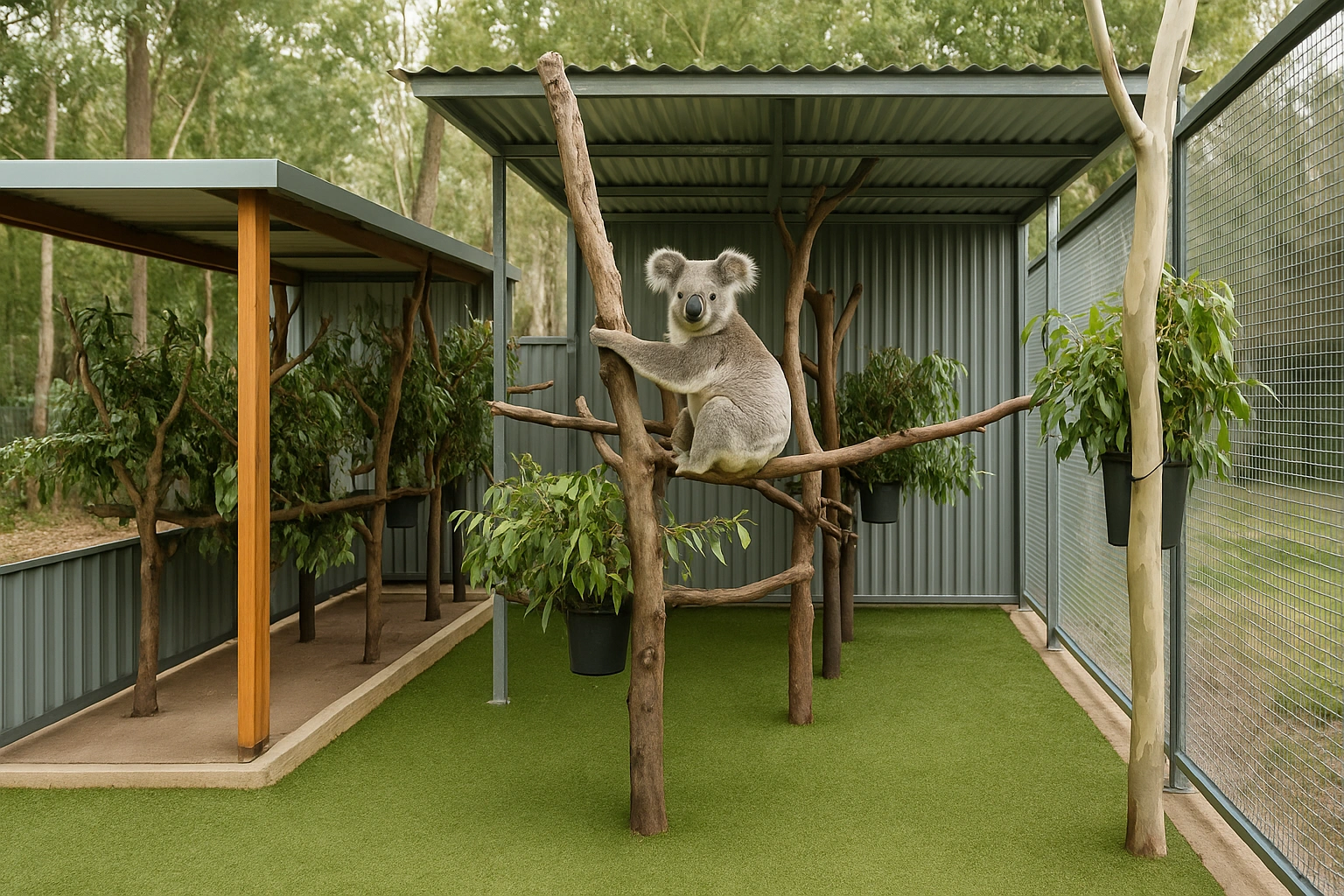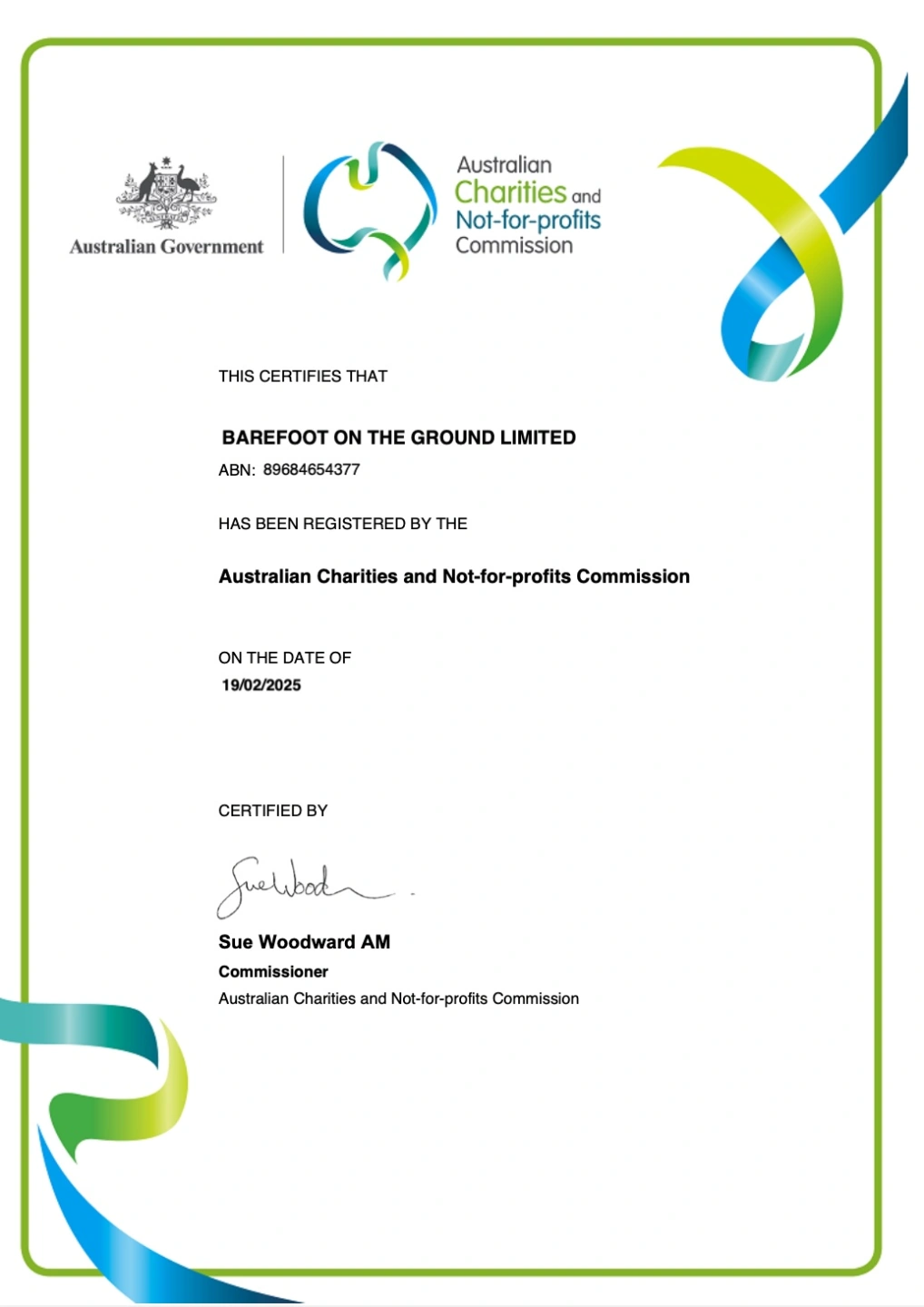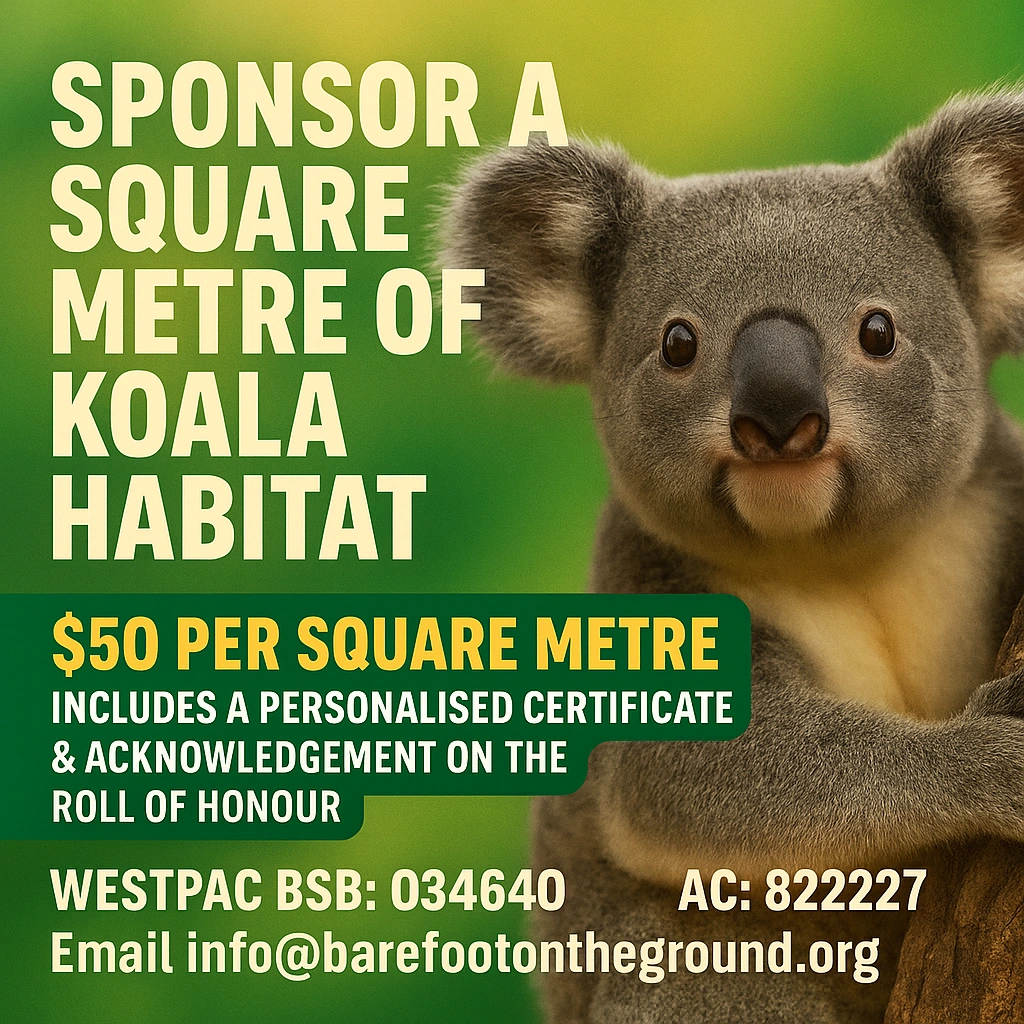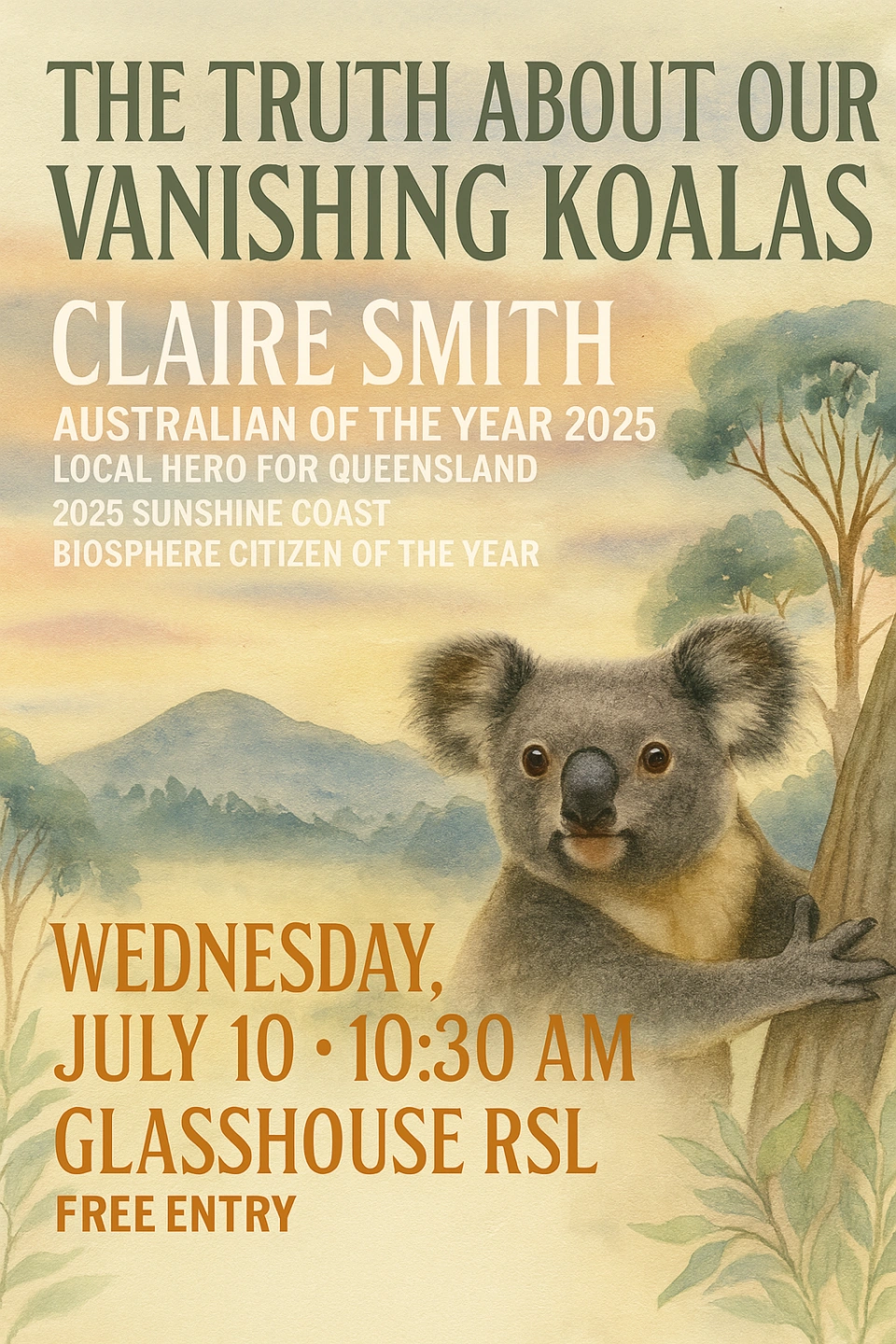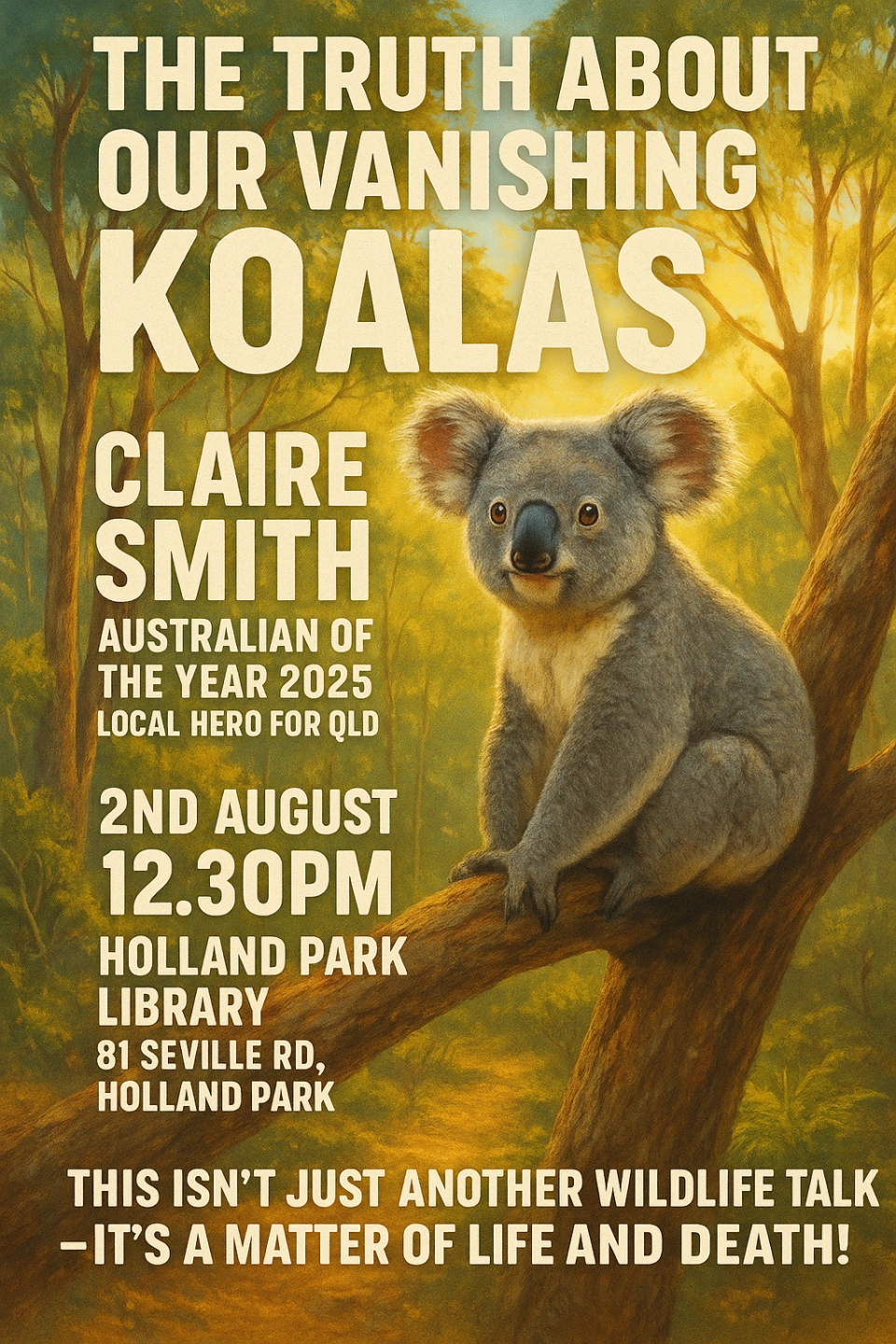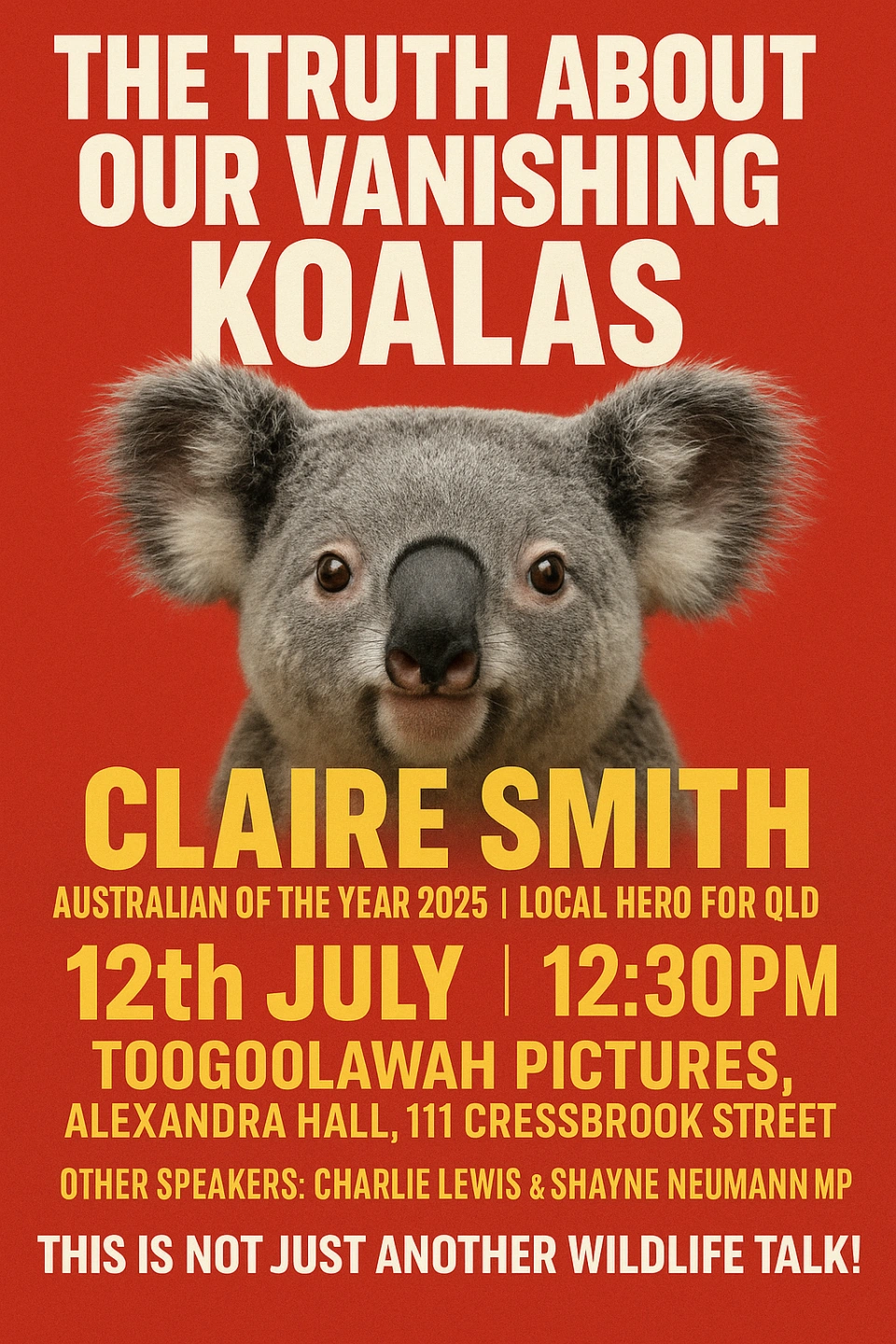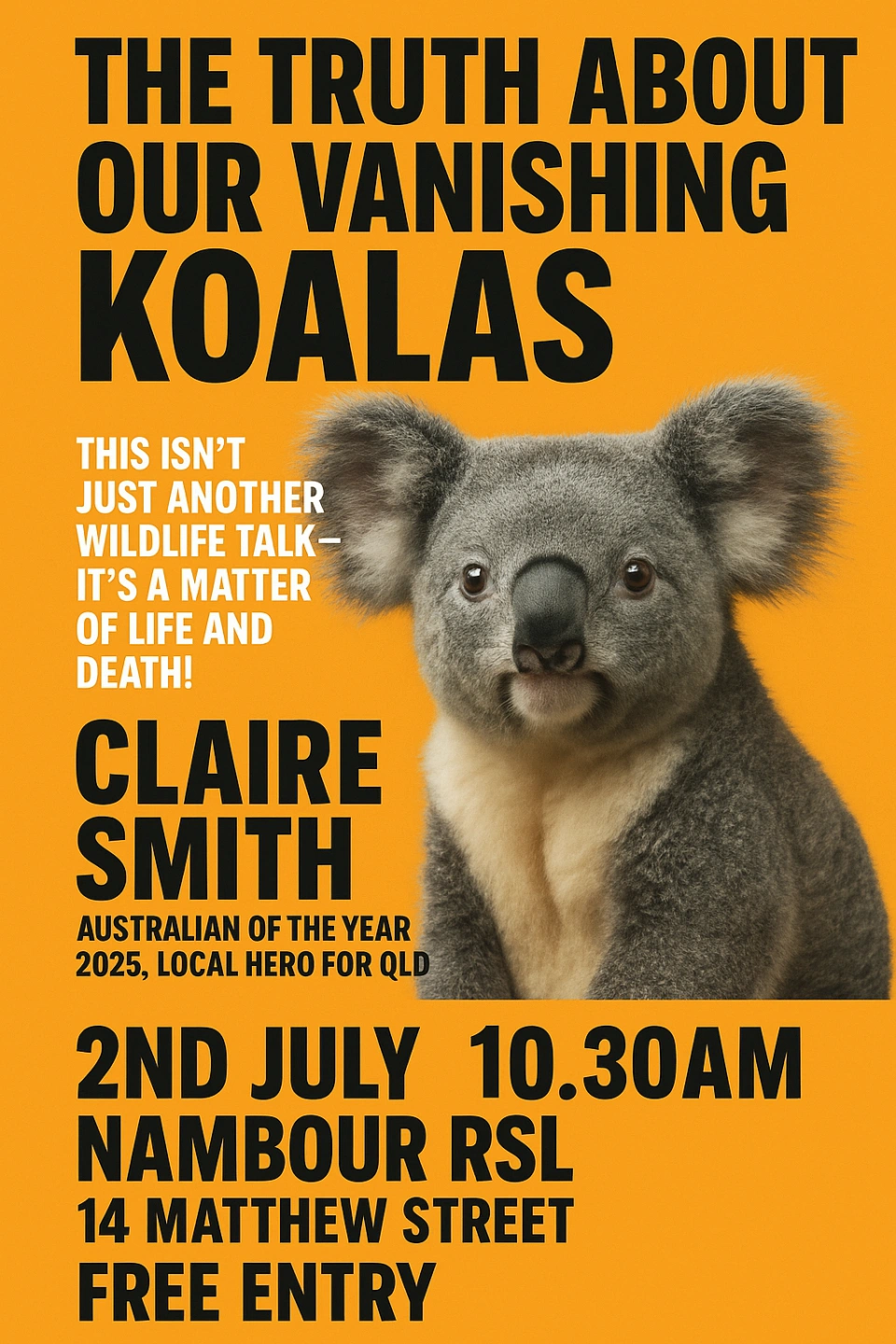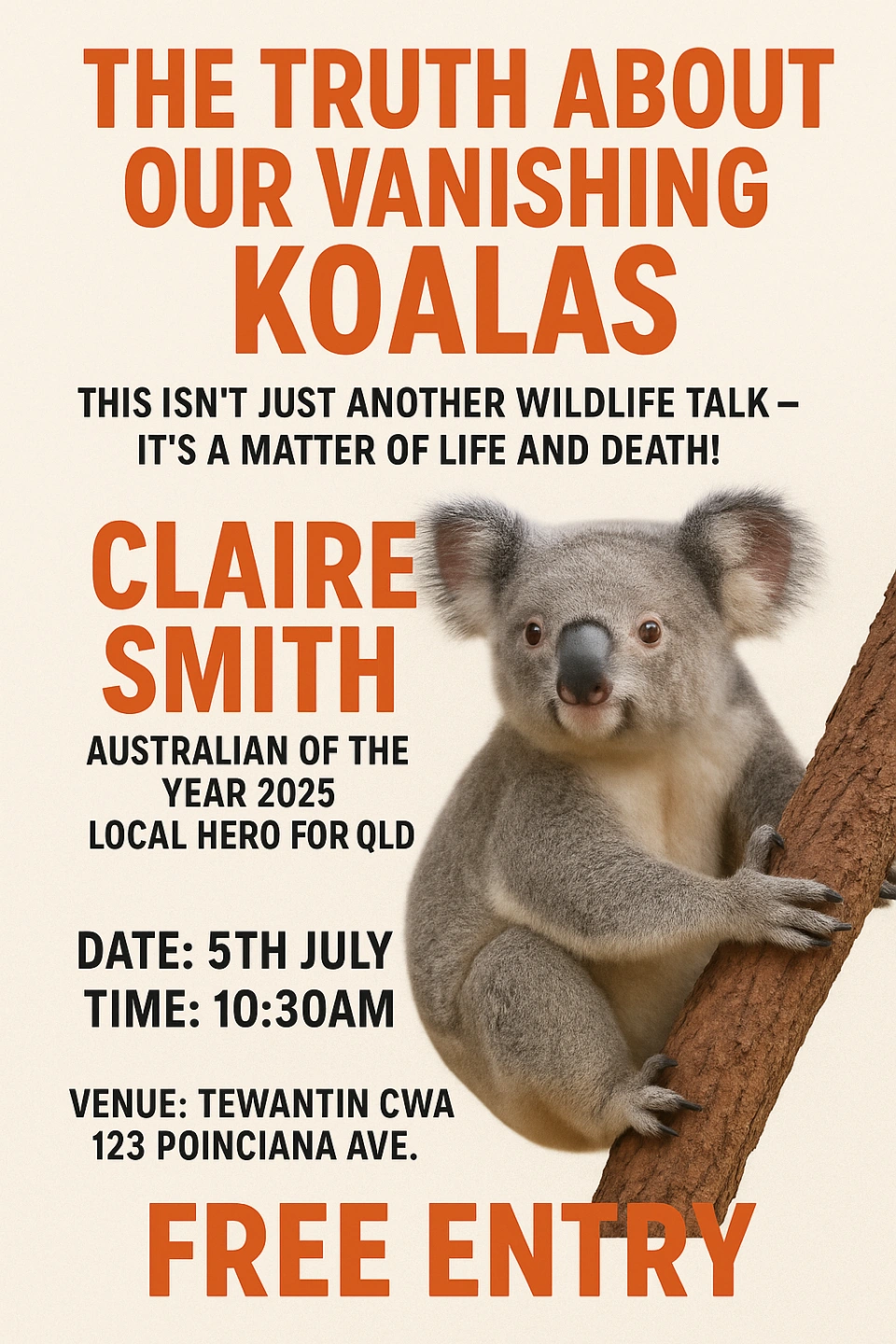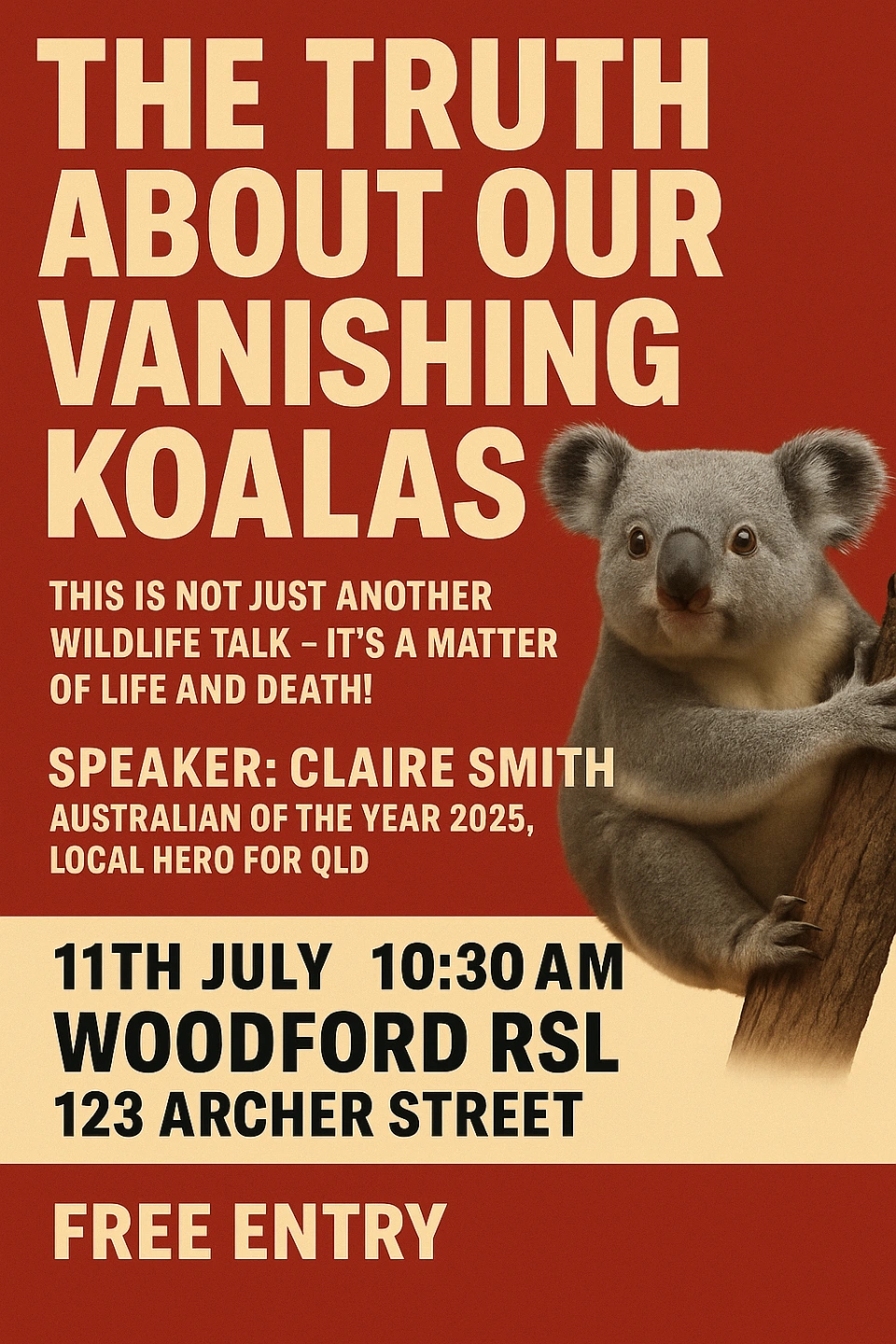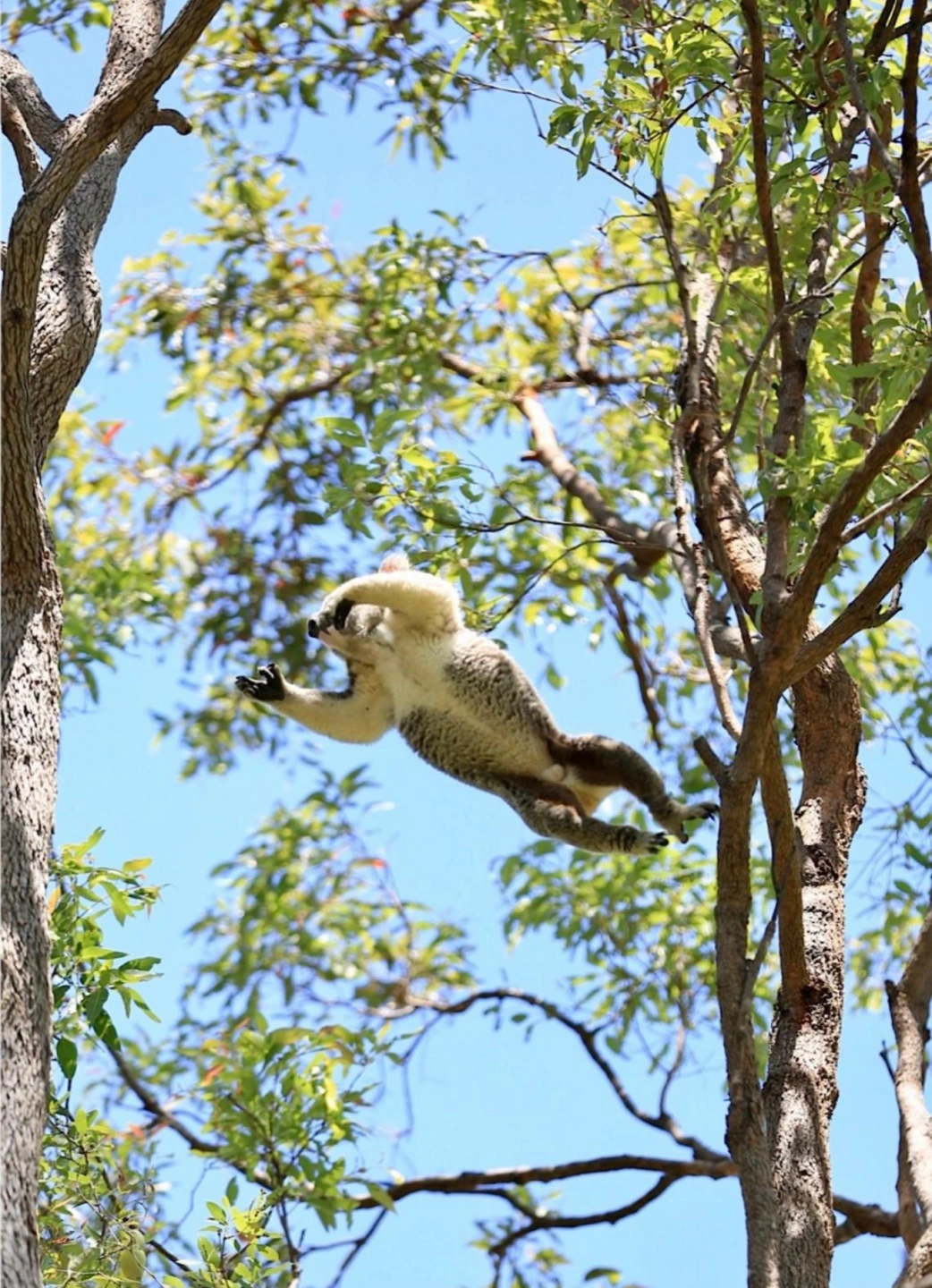

We Are Committed To A Brighter Future For Koalas & All Species Of Wildlife
Every day, across Queensland, ancient gum trees fall. Bulldozers roll in. And the quiet lives of our native wildlife are extinguished — sometimes literally overnight.
Among the most vulnerable is the iconic koala, a species now listed as endangered in QLD, NSW, and the ACT. Despite this listing, over 17,000 hectares of koala habitat were bulldozed in Queensland in a single year (2018–19) alone — and the destruction continues.
While a network of wildlife carers and veterinary specialists provide critical rescue and emergency care, and short-term rehabilitation is available for affected animals, long-term rehabilitation and suitable habitat for release remain major challenges. Many traditional release sites have disappeared or are no longer viable due to urban encroachment, fragmented landscapes, and increasing human-wildlife conflict. In many cases, animals are released into areas that are no longer safe, resulting in low survival rates and repeated rescues.
This is where Barefoot on the Ground can play a transformative role. We propose to secure a vital parcel of land that will serve as both a wildlife rehabilitation sanctuary and a dedicated, secure release site, providing affected species with a significantly higher chance of long-term survival.
IT WILL BE THE LARGEST KOALA REHABILITATION FACILITY IN AUSTRALIA.
Why This Land is Critical for Conservation
The property is situated in a quiet, rural area with a diverse range of appropriate habitats, making it an ideal location for long-term rehabilitation and safe release of specialised wildlife.
It borders the D’Aguilar Ranges, the largest protected area of continuous forested habitat on the north side of Brisbane, which stretches from Mt Coot-tha to Woodford. This vast, intact ecosystem provides rare, threatened, and specialised wildlife their best chance at survival.
It is in close proximity to Wivenhoe and Somerset Dams, the largest bodies of water in SEQ, offering non-urban, protected wetland habitats for aquatic species.
With increasing habitat destruction, this strategic investment will provide a long-term solution for displaced and injured wildlife. By securing this property, we can protect and rehabilitate wildlife while preserving vital ecosystems for future generations.
At Barefoot on the Ground, we believe education is the key to lasting conservation. We will offer hands-on learning experiences that brings conservation to life for schools, universities, and the public.
By focusing on youth engagement, we’ll be nurturing the next generation of environmental stewards.
Our co-founder, Claire Smith, is the 2025 Australian of the Year, Queensland Local Hero, recognised for her decades of leadership in wildlife rescue, education, and environmental advocacy.
Barefoot on the Ground Ltd is a Registered Charity and Not-For-Profit organisation registered with ACNC and ASIC. We are also a DGR registered organisation and all donations over $2 are tax deductible.
Click on the link below:
https://simplebooklet.com/barefootprospectus1#page=1
ABN:89684654377
Use our QR code below to donate.
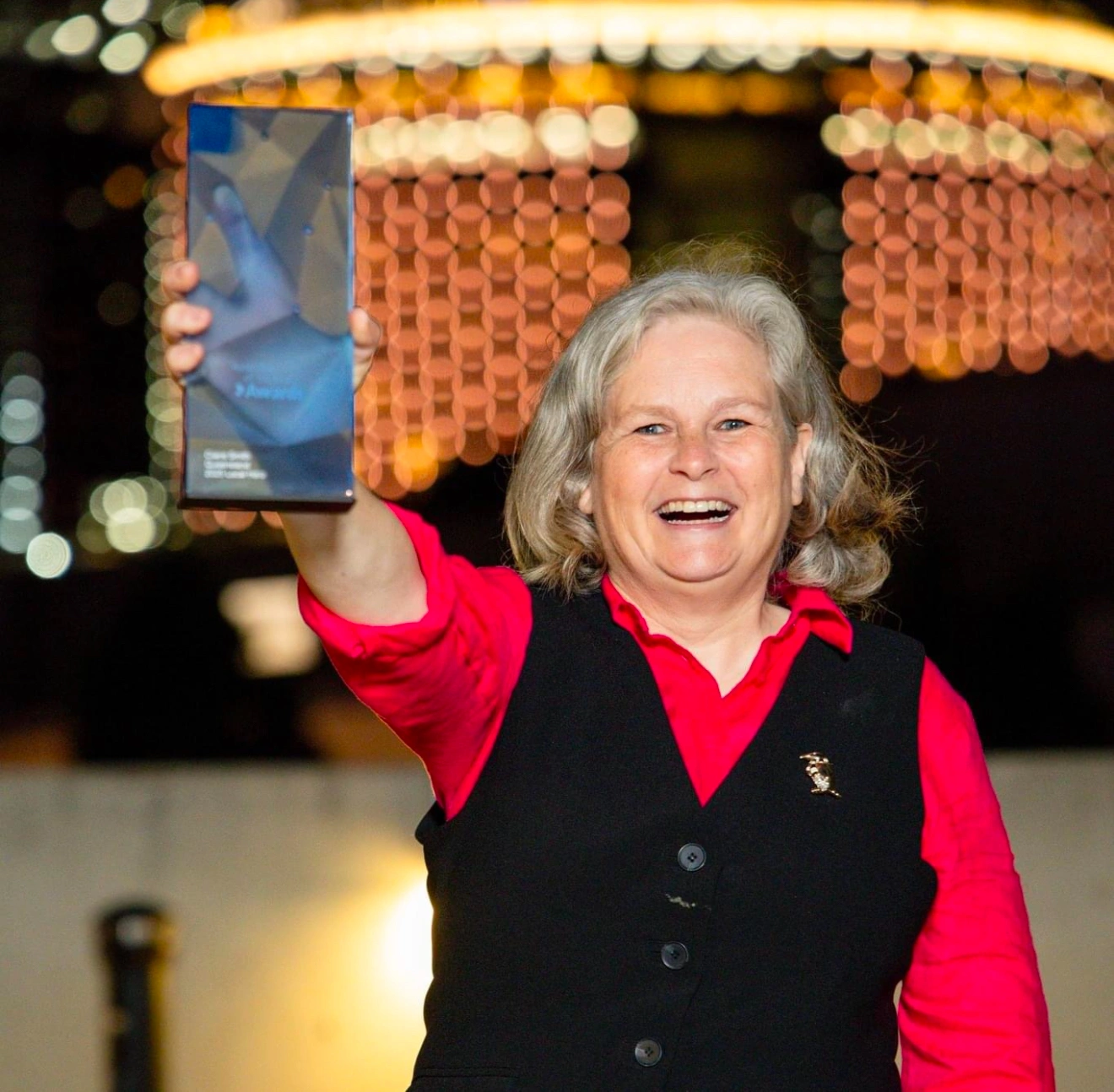
BECOME A DONOR AND CREATE A LEGACY
Barefoot on the Ground Ltd is a Registered Charity and Not-For-Profit organisation registered with ACNC and ASIC. We are also a DGR registered organisation and all donations over $2 are tax deductible.
Our co-founder, Claire Smith, is the 2025 Australian of the Year, Queensland Local Hero, recognised for her decades of leadership in wildlife rescue, education, and environmental advocacy.
Click here to donate: https://www.paypal.com/ncp/payment/HKDNRNQSNT2HQ
Watch our latest video here. https://youtu.be/vAlHGEWRhaA
ABN:89684654377
A SAFE HAVEN

A Community Driven Vision
By engaging local communities in environmental stewardship, we will foster a sense of ownership and pride. Our scientific monitoring of rehabilitated wildlife and restored habitats will ensure our conservation efforts are effective and adaptable, creating a blueprint for sustainable environmental management across Queensland.
At the heart of Barefoot on the Ground is a vibrant, passionate community. We will empower local volunteers, schools, and stakeholders to take part in hands-on conservation projects—from restoring habitats to caring for injured wildlife.
The property will serve as a hub for grassroots environmental action, offering education, resources, and opportunities for community involvement. This approach fosters a deeper connection to nature.

Wildlife Rehabilitation, Low-impact eco-tourism and education
These are AI generated impressions of what our wildlife rehabilitation, low-impact eco-tourism and education facilities are going to look like.
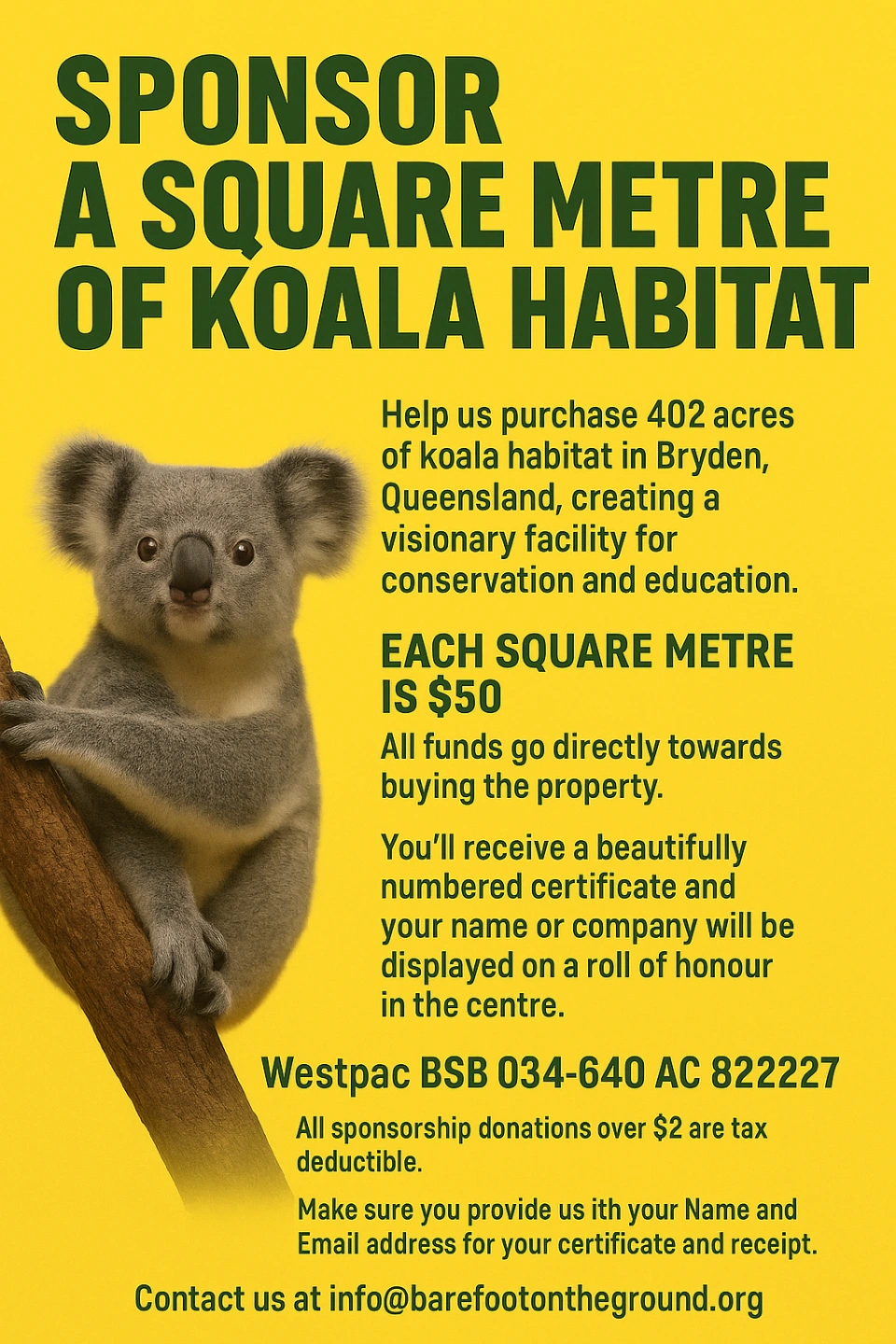
HOW YOU CAN HELP
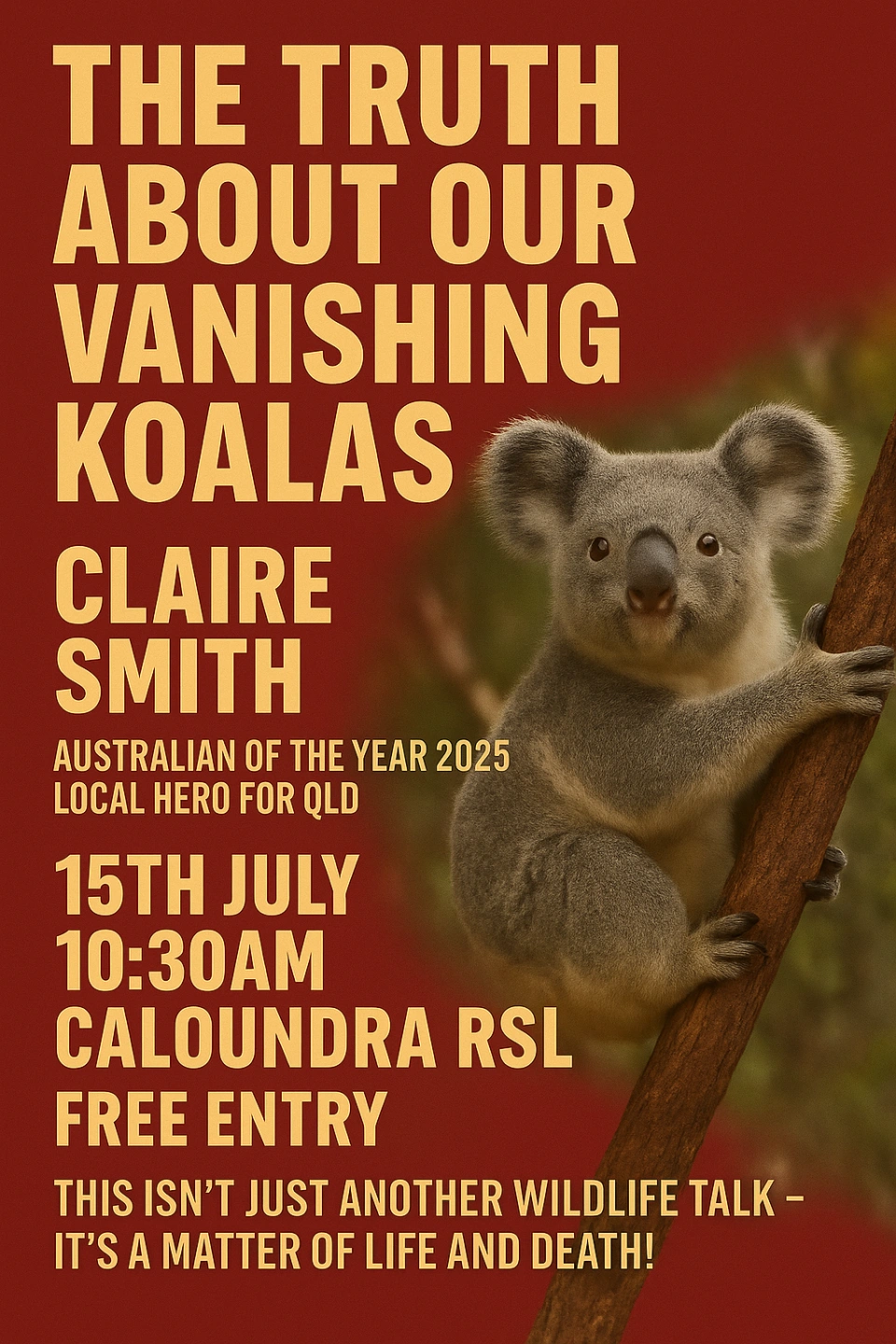
WE GO AND MEET WITH COMMUNITIES ACROSS QLD
THIS IS WHAT WE STAND FOR.
We would love to tell you our story and why we are on this mission in more detail. The following documents do just that. If you have any questions please feel free to contact us.
Barefoot on the Ground is unique in education and conservation due to its immersive and hands-on approach. It will offer day and night programs where visitors can observe wildlife like koalas and gliders in their natural habitats, enhancing understanding through direct experience. The centre will also integrate wildlife rehabilitation, ensuring injured and orphaned animals are cared for and released back into the wild, and run a horticultural program propagating native plants to restore ecosystems. Additionally, it will provide bush camping experiences that teach essential outdoor skills, fostering a deep connection with nature. This holistic approach combines education, conservation, and practical engagement, making it a standout in its field.
"Barefoot on the Ground" stands out for its holistic approach to education and conservation, which integrates immersive, hands-on experiences with wildlife and a strong commitment to environmental stewardship. Here are the unique aspects that make it distinct:
Immersive Wildlife Education: Barefoot on the Ground offers guided tours both daytime and nighttime, allowing participants to observe wildlife in their natural habitats. This includes spotlighting walks and using elevated canopy platforms to observe nocturnal species, providing a unique and direct way to learn about wildlife behaviours and their ecological roles.
Wildlife Rehabilitation: The centre actively rehabilitates orphaned and injured wildlife, ensuring their healthy return to the wild. This hands-on experience with wildlife care offers visitors an intimate understanding of the challenges and processes involved in conservation.
Native Plant Propagation: Barefoot on the Ground runs a horticultural program to propagate native plants to restore and sustain local ecosystems. This program supports the centre's broader environmental goals by enhancing habitat restoration efforts and educating visitors on the importance of native flora.
Eco-Tourism and Bush Camping: The centre promotes eco-tourism by providing bush camping experiences where visitors can learn essential outdoor skills and foster a deep connection with nature. These activities are designed to be both educational and enjoyable, emphasising sustainable practices and environmental awareness.
Community and Research Engagement: Barefoot on the Ground collaborates with schools, community groups, organisations, and researchers, allowing them to engage in conservation efforts and learn about wildlife through direct interaction and research initiatives.
Holistic Conservation Mission: Barefoot on the Ground's mission extends beyond education to active conservation and rehabilitation efforts, aiming to create a brighter future for local wildlife and ecosystems. The centre serves as a catalyst for conservation and a hub for sustainable eco-tourism, inspiring the next generation of environmental stewards.
These features collectively make Barefoot on the Ground a unique and impactful organisation in the realms of wildlife education and conservation.
WHY RUN WILDLIFE EDUCATION PROGRAMS FOR CHILDREN?
Participating in educational programs such as the Wildlife Explorers Program can offer numerous long-term benefits to children. These benefits span cognitive, emotional, social, and physical aspects of development, fostering well-rounded growth and fostering a lifelong appreciation for nature and the environment.
Cognitive Benefits
Enhanced Knowledge and Understanding: Children gain in-depth knowledge about wildlife, habitats, and ecosystems, which enhances their overall understanding of biology and environmental science. This knowledge foundation can support academic performance and foster a keen interest in science and conservation.
Critical Thinking and Problem-Solving Skills: Activities like scavenger hunts and interactive storytelling encourage children to think critically, solve problems, and make observations, which are essential skills for academic success and everyday decision-making (Tourism Research Australia) (Fortune Business Insights).
Emotional Benefits
Empathy and Compassion: Learning about wildlife and their habitats helps children develop empathy and compassion for animals and the environment. This emotional connection can motivate them to engage in conservation efforts and adopt environmentally friendly behaviours.
Stress Reduction and Well-Being: Spending time in nature has been shown to reduce stress and improve mental well-being. Nature-based programs provide children with opportunities to relax, unwind, and experience the calming effects of the natural environment (tourism.australia.com).
Social Benefits
Teamwork and Collaboration: Group activities such as scavenger hunts and discussions foster teamwork and collaboration. Children learn to work together, share ideas, and support each other, which are essential social skills.
Communication Skills: Interactive storytelling and group discussions help children develop their communication skills, including listening, speaking, and expressing their thoughts and ideas clearly (Ecotourism Australia).
Physical Benefits
Increased Physical Activity: Nature walks and outdoor activities promote physical activity, which is crucial for children's physical health and development. Regular physical activity helps improve fitness, coordination, and overall health.
Sensory Development: Exploring nature enhances sensory development as children use their senses to observe and interact with their environment. This hands-on exploration helps improve their sensory perception and awareness.
Long-Term Environmental Stewardship
Sustainable Practices: Early exposure to environmental education instils sustainable practices and habits in children. They learn the importance of conservation, recycling, and protecting natural resources, which they carry into adulthood.
Future Conservation Leaders: These programs can inspire children to become future conservation leaders and advocates for the environment by fostering a deep connection with nature and understanding environmental issues. They may pursue careers in environmental science, conservation, and related fields, contributing to global efforts to protect the planet (Fortune Business Insights) (Ecotourism Australia).
Lifelong Appreciation for Nature
Connection to Nature: Programs like the Wildlife Explorers Program nurture a lifelong appreciation for nature. Children who develop a love for the outdoors are more likely to engage in outdoor activities and support conservation efforts throughout their lives.
Awareness and Advocacy: Educated children are more aware of environmental issues and are likely to advocate for policies and practices that protect the environment. They become informed citizens who can influence positive change in their communities and beyond.
Conclusion
The long-term benefits of participating in educational programs such as the Wildlife Explorers Program are profound and multifaceted. These programs enhance children's knowledge and skills and foster emotional well-being, social development, and a lifelong commitment to environmental stewardship. Engaging children in meaningful and immersive nature-based experiences can help cultivate a generation of informed, compassionate, and proactive individuals dedicated to preserving our planet.
1. Conservation Awareness and Action
Knowledge is Power. Education gives individuals the knowledge necessary to understand and address environmental challenges. By learning about local wildlife and ecosystems, people can make informed decisions and contribute to conservation.
Behavioural Change: Wildlife education fosters a sense of responsibility and stewardship towards the environment. As individuals become more aware of the impact of their actions, they are more likely to adopt sustainable practices that benefit wildlife and their habitats.
2. Biodiversity Protection
Understanding Ecosystems: Comprehensive education programs help people understand the intricate relationships within ecosystems. Knowing how species interact and depend on each other underscores the importance of biodiversity and the need to protect it.
Species Survival: Educating the public about endangered species and their threats can drive collective efforts to protect and preserve them. Rehabilitation and release programs, combined with public awareness, enhance the chances of survival for vulnerable wildlife.
3. Community Engagement and Empowerment
Local Involvement: Engaging the community in wildlife education initiatives builds a network of informed advocates who can support and promote conservation efforts. Community-driven projects often have a lasting impact as they are rooted in local knowledge and commitment.
Youth Engagement: Targeting educational programs at schools and youth groups ensures that the next generation understands the importance of conservation. This early exposure can inspire lifelong commitments to environmental stewardship and careers in related fields.
4. Economic and Sustainable Tourism Benefits
Eco-Tourism: Wildlife education centres can become significant attractions for eco-tourism, bringing economic benefits to the local area. Visitors drawn by unique educational experiences contribute to the economy while learning about conservation.
Sustainable Practices: Wildlife education centres can promote sustainable tourism, demonstrate and advocate for responsible travel practices that minimise environmental impact, and support local communities.
5. Health and Well-being
Connection with Nature: Studies have shown that spending time in nature has numerous health benefits, including reduced stress, improved mental health, and enhanced well-being. Wildlife education centres provide opportunities for people to reconnect with nature, benefiting individuals and the environment.
Outdoor Learning: Hands-on, outdoor learning experiences are particularly effective in fostering a connection to nature. By engaging all senses, these immersive experiences can deeply instil conservation values and a sense of wonder about the natural world.
6. Research and Innovation
Scientific Contribution: Wildlife education centres often collaborate with researchers and scientists, contributing valuable data and insights into wildlife behaviour, health, and ecosystems. These collaborations can lead to innovative conservation strategies and solutions.
Citizen Science: Involving the public in citizen science projects, where they can collect data and observe wildlife, increases scientific literacy and contributes to large-scale research efforts. This active participation enhances understanding and support for conservation initiatives.
Expected Outcomes
Increased Conservation Awareness: A more informed public that actively participates in conservation efforts and adopts sustainable practices.
Enhanced Biodiversity Protection: Improved survival rates for endangered species through education and rehabilitation programs.
Community Empowerment: A network of local advocates supporting and promoting conservation initiatives.
Economic Growth through Eco-Tourism: Increased tourism revenue benefits the local economy and promotes sustainable practices.
Improved Health and Well-being: Enhanced mental and physical health for individuals through nature engagement.
Advancements in Research and Innovation: New insights and data contributing to wildlife conservation and ecosystem management.
Long-Term Benefits
Sustainable Ecosystems: Long-term protection and restoration of local ecosystems and biodiversity.
Educated and Engaged Public: A society that values and actively participates in environmental conservation.
Economic Sustainability: A thriving eco-tourism industry that supports local economies and promotes sustainable practices.
Healthier Communities: Improved well-being of individuals through regular engagement with nature.
Innovative Conservation Solutions: Continued advancements in conservation strategies through ongoing research and public participation.
Testimonials
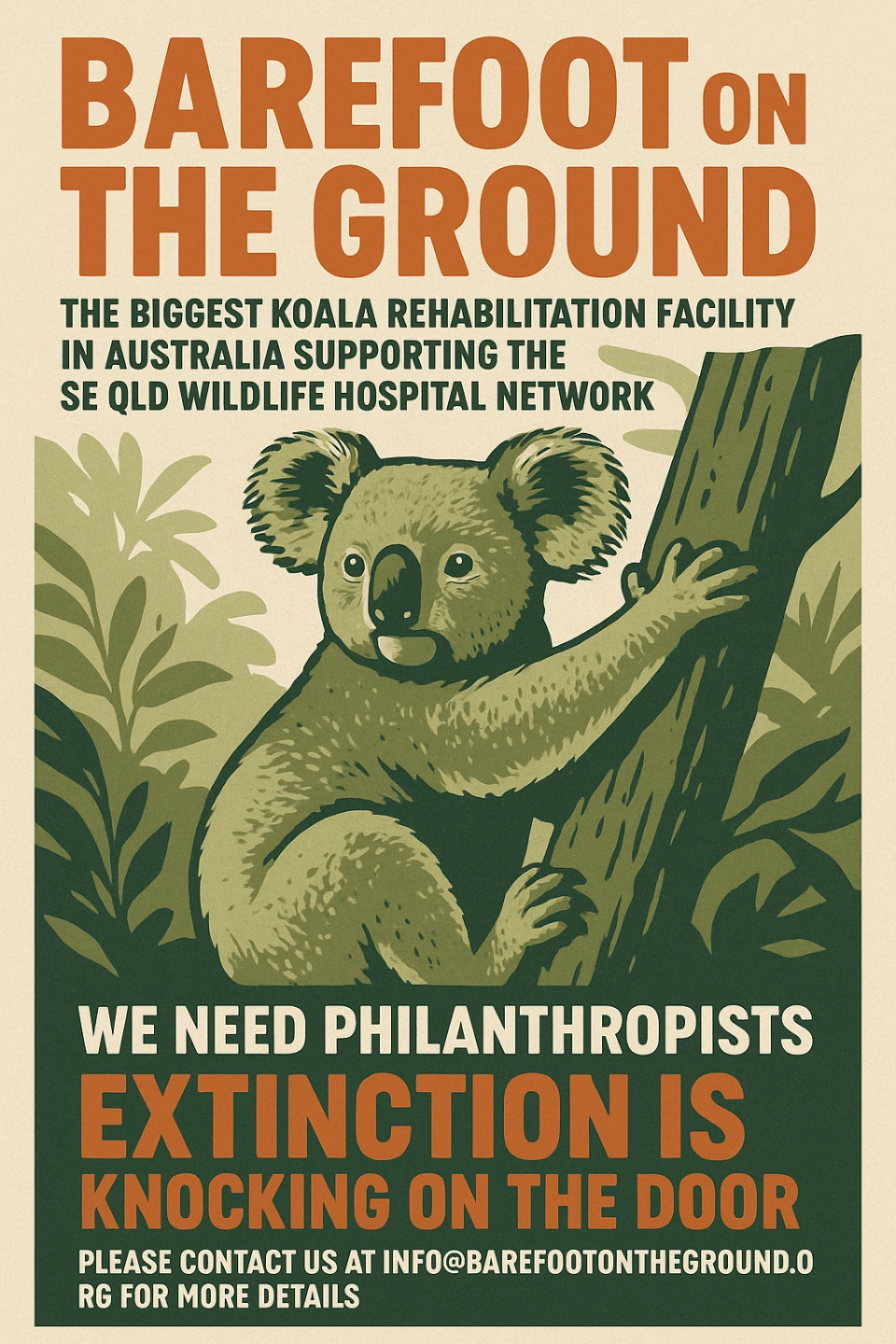
BECOME A SPONSOR TODAY!
“Australia’s Largest Koala Rehabilitation Centre Planned for SEQ — If Funding Can Be Secured”
This visionary initiative will directly support the Southeast Queensland Wildlife Hospital Network, dramatically increasing care capacity and relieving the pressure currently placed on overburdened wildlife hospitals across the region.
“Koalas are officially listed as endangered in Queensland, and we are on the brink of losing them in the wild if we don’t act,” said Claire Smith, CEO of Barefoot on the Ground. “This facility will not just provide care for koalas and threatened species; it will also offer long-term rehabilitation, breeding programs, and community-led education programs to inspire change.”
The planned 400-acre centre will include:
Specialised koala and threatened species programs with state-of-the-art treatment & care facilities.
Long-term rehabilitation areas for wildlife recovering from injury.
Breeding programs for species on the brink of extinction, led by national experts.
Wildlife education and community engagement spaces to raise awareness about habitat loss and conservation.
“This is more than just a rehabilitation facility or a sanctuary,” said Claire. “It’s a line in the sand. It’s about giving future generations a chance to see koalas in the wild, not just as exhibits in zoos.
We’re inviting all Australians, businesses, and philanthropists to be part of this bold step forward.”
How to Support Individuals and organisations can contribute by sponsoring square metres of koala habitat at a cost of $50 per sqm, with every donation over $2 tax-deductible.
For more information, sponsorship opportunities, or media inquiries: Claire Smith
0432 310 556CEO, Barefoot on the Ground Environmental Organisationinfo@barefootontheground.orgABN: 89684654377
JOIN THE BAREFOOT ALLIANCE
We are The Barefoot Alliance — and we’ve had enough.
Enough of watching our wildlife die while developers get the green light. Enough of governments bowing to foreign investors, while everyday Aussies can’t afford a home. Enough of the fake progress that clears bushland, crushes communities, and calls it “growth.”
We are farmers. Wildlife carers. Teachers. Truck drivers. Nurses. Parents. Grandparents. Veterans. We are not radicals — we are realists. And we know that what’s happening to our koalas is a symptom of something much bigger:
A nation being sold off. A culture being diluted. A people being ignored.
We believe in action, not endless talking. In sovereignty, not submission to global bodies with no stake in our soil. In connection — to land, to country, to each other.
The Barefoot Alliance is a movement.
We’re building a network — electorate by electorate — with boots (and bare feet) on the ground.
We will not be bought.
We will not be silenced.
We will not be divided.
This is our line in the sand.
This is our country.
And we’re taking it back.
We are The Barefoot Alliance.
And we fight for the wild, the free, and the future.
By joining the Barefoot Alliance your voice will be added to every single document we present to Government.
You will become part of a movement that will deliver radical change in wildlife protection.
You will become part of a movement that will grow into the largest National Organisation in Australia, advocating and successfully achieving meaningful, lasting change for our environment and wildlife.
You will receive;
The quarterly BAREFOOT ALLIANCE MEMBER E-MAGAZINEl
A Barefoot Alliance Car Sticker
A Barefoot Enamel Pin Badge
LIVE Zoom Meetings
All subscriptions to Barefoot Alliance will be used to fund the purchase of the property in Bryden where our koala rehabilitation centre and education facility will be located.
Join as an individual or group.
Submit your details today and we will send you a membership invoice.







